Let me tell you, after years in recruiting, I’ve seen it all: stacks of resumes, marathon interview schedules, and the constant question – am I choosing the right person for the job?
Thankfully, the world of hiring has evolved. Hiring assessment tools are no longer a futuristic fantasy but a powerful reality that can streamline your process and pinpoint the perfect candidate.
In this blog, we’ll dive deep into the world of recruitment assessment tools. We’ll explore the different types and how they can benefit your hiring process, and we’ll even unveil the top contenders in the hiring assessment tool arena.
Let’s get started!
What Is a Hiring Assessment Tool?
A hiring assessment tool is a software or system used by employers to evaluate the skills, abilities, and personality traits of potential candidates to ensure they are a good fit for the organization. These tools often include tests, quizzes, simulations, and psychological assessments designed to predict job performance.
According to HireDNA, 82% of companies use some form of a pre-hiring assessment test in their hiring process, and a good online pre-hire assessment tool can surely offer a lot of assistance.
For example, a tech company might use a coding test to evaluate the technical skills of software engineering candidates, ensuring only those proficient in the required programming languages and problem-solving move forward in the hiring process.
Watch: How to Choose the Best Assessment Software
List of the Top Hiring Assessment Tools
Let’s have a look at some of the most popular hiring assessment tools on the market. Here is my personal experience with using these tools to hire candidates on different occasions.
1. ProProfs Quiz Maker
Best for Creating Secure Assessments With AI & Templates
In my time managing recruitment processes, ProProfs Quiz Maker has consistently impressed me as an excellent tool for creating secure skill and psychometric assessments.
This candidate assessment tool contains an AI quiz maker to create assessments on any topic in just a few seconds. It also contains a large number of customizable assessment templates that allow for the quick creation of quizzes tailored specifically to the job role you are looking to fill.
Besides, it supports 20+ question types, including video interviews, which I used to get a detailed view of the candidates’ knowledge. It also supports detailed reports and analytics, ensuring you get a comprehensive understanding of each candidate’s strengths and areas for improvement.
What You Will Like:
- Automatic grading and scoring features to ensure real-time delivery of feedback and results.
- Reminders and notifications for assessments to improve the completion rates.
- Custom branding and white-labeling options to ensure that the assessments align with your brand identity.
- Support for 70+ global languages, which makes this tool versatile and globally applicable.
- A vast question bank with 1,000,000+ assessment questions on various topics, which you can include directly in your quizzes.
- Seamless integration with various third-party tools such as Salesforce, Google Analytics, Hubspot, and more.
What You May Not Like:
- The free version contains a few ads.
- It does not support a dark mode on the web.
Pricing: Forever FREE for short quizzes and all essential features. Paid starts at $19.99/month.
2. Evalgator
Best for Coding Skills Evaluation
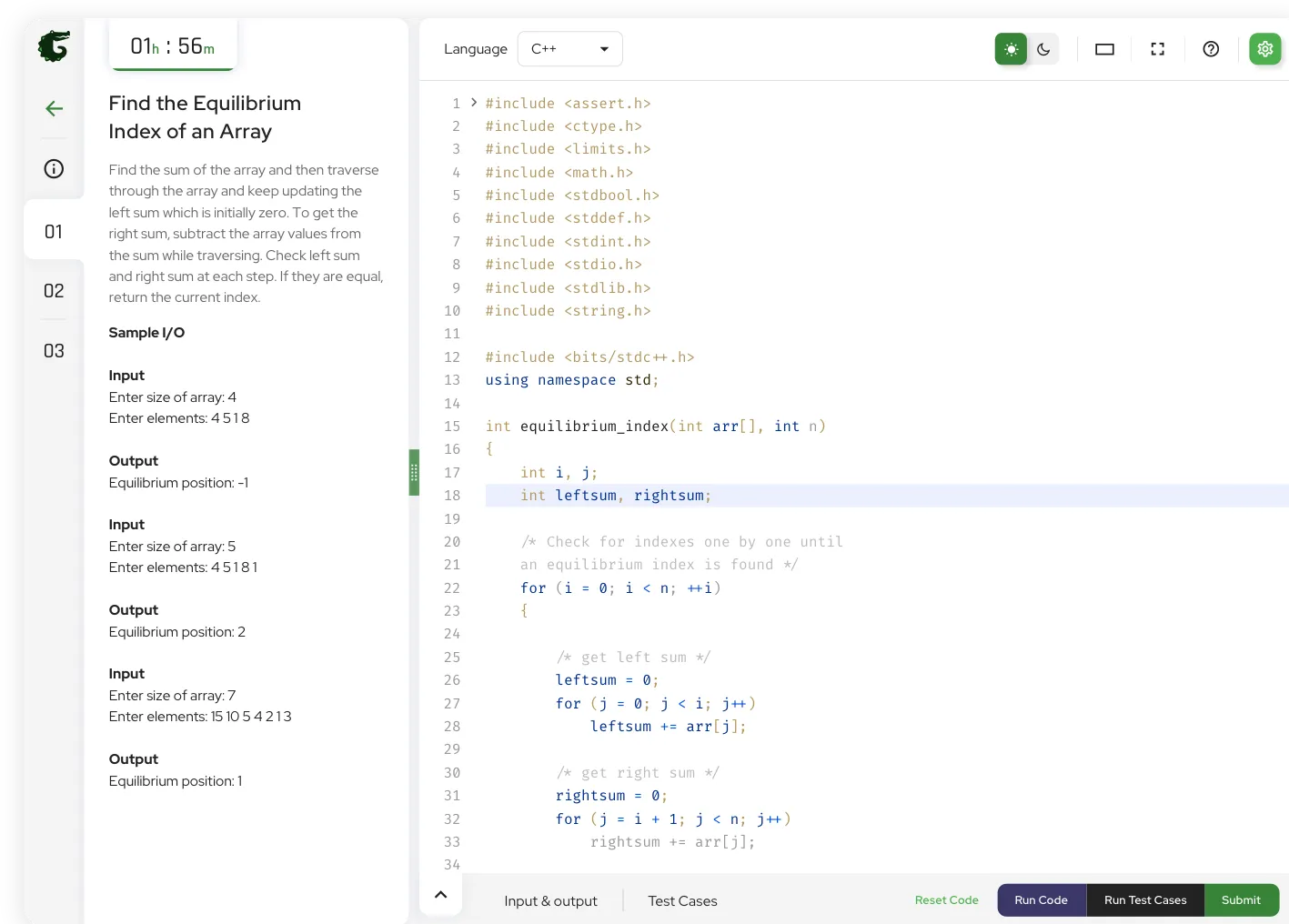
(Image Source: Evalgator)
I really like Evalgator as a pre-employment assessment tool because of its specialized, user-friendly platform where candidates can demonstrate their coding skills in real-time under conditions that mimic the challenges they would face in their daily work.
This hands-on approach to evaluating technical expertise ensures we assess practical skills and provides insight into a candidate’s problem-solving process and efficiency under pressure.
According to me, one of the best features of the tool is its support for various programming languages, which is indispensable given the diverse technology stacks most companies employ.
What You Will Like:
- Real-time code execution allows for an accurate assessment of a candidate’s coding ability.
- An automated scoring system that streamlines the evaluation process, saving time.
- Test environments can be customized to fit specific job requirements, making assessments more relevant.
- Detailed reports, which provide insights into candidates’ code efficiency and logic.
- The platform is highly scalable and is capable of assessing numerous candidates simultaneously.
What You May Not Like:
- Setting up and interpreting the tests requires technical expertise, which might be a barrier for non-technical HR personnel.
- The focus on coding limits its usefulness for assessing other professional skills.
Pricing: Starts at $1/candidate.
3. ThriveMap
Best for Team Fit Analysis
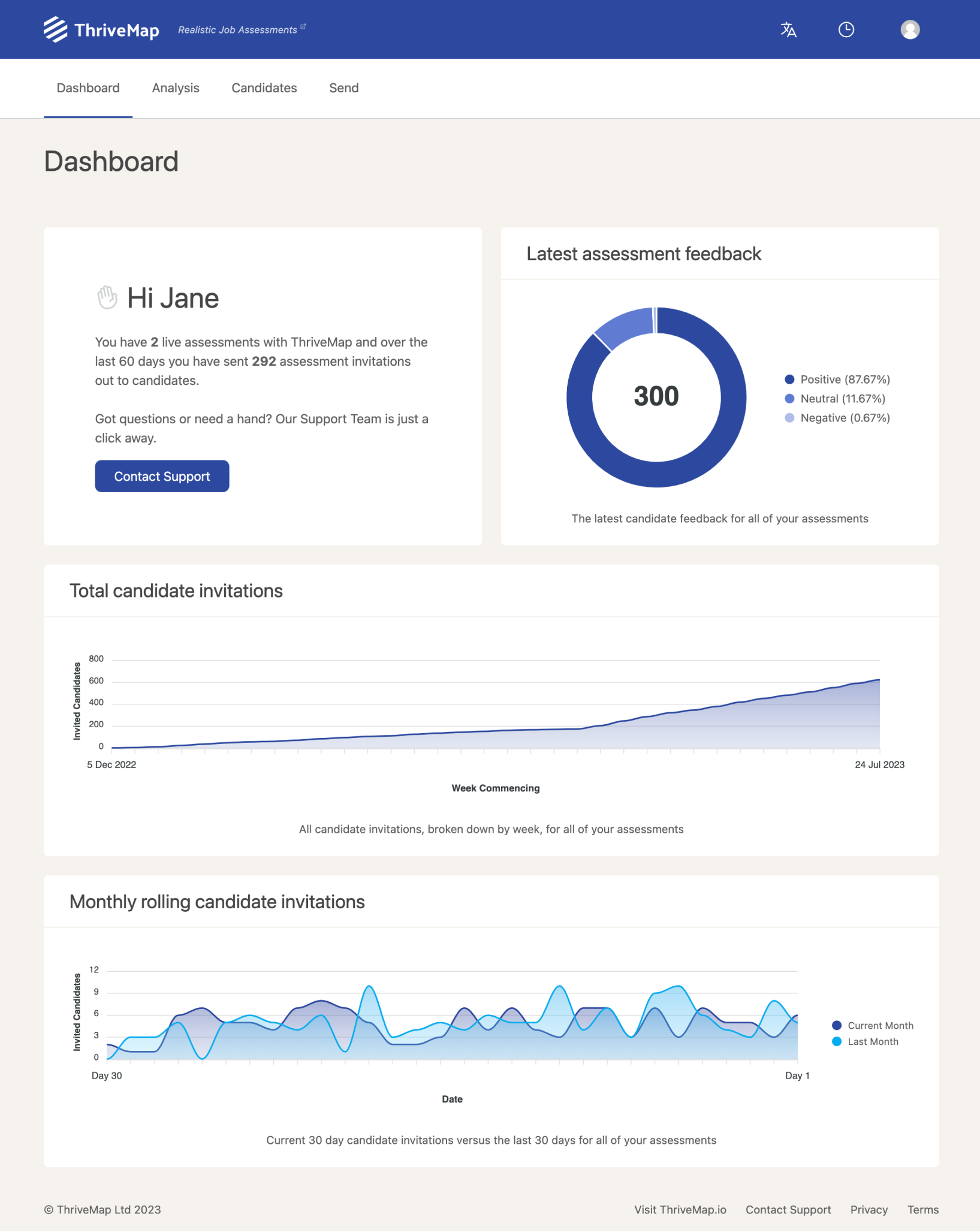
(Image Source: Capterra)
I used ThriveMap to assess the candidates who are the right fit for my team, and it works really well. It uses simulations and real-life scenarios to evaluate potential hires, which gave me clear insights into their practical skills and how they would perform in our specific workplace environment.
This approach has proven invaluable for predicting candidate success and ensuring they are a good fit culturally and operationally. The detailed reports from ThriveMap helped to make informed decisions, reducing the likelihood of turnover and boosting team cohesion right from the start.
It’s a strategic asset in building teams that are not only skilled but also harmoniously integrated.
What You Will Like:
- Scenarios and simulations that provide realistic job previews, helping assess candidate suitability more effectively.
- The assessments can be easily customized to reflect the specific work environment of a company.
- Analytical tools that offer detailed insights into how well candidates would fit into team dynamics.
- It accommodates both remote and in-person team configurations, offering versatility.
- It has a strong focus on cultural fit and aims to enhance employee retention over time.
What You May Not Like:
- The assessments are limited to predefined scenarios, which may not cover all possible workplace situations.
- There are restrictions in customizing tests for individual candidates, questioning the tool’s flexibility in addressing specific recruitment needs.
Pricing: Starts at $1/assessment.
4. Qualified
Best for Software Development Skills Evaluation
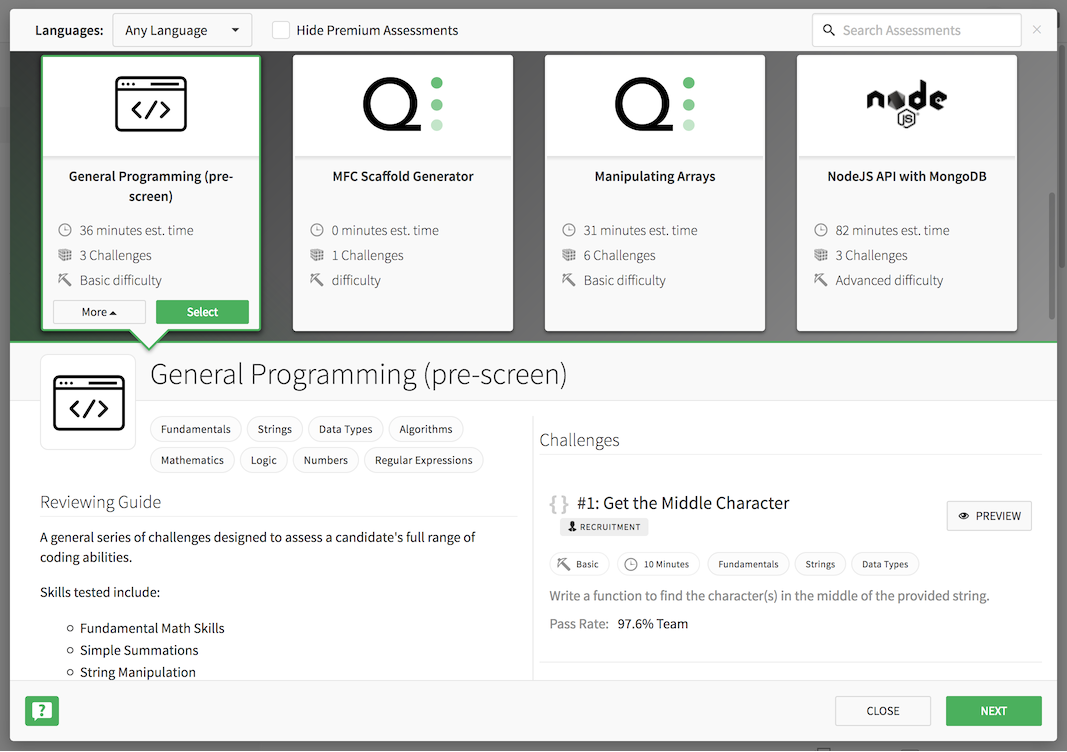
(Image Source: Qualified)
My experience with Qualified has shown it to be an outstanding platform for comprehensively evaluating software development skills.
Its project-based assessments simulate real-world problems that require innovative solutions, closely reflecting the actual tasks the candidate would handle on the job. This realistic testing environment is key in assessing a candidate’s ability to handle job pressures, manage complex projects, and collaborate with team members.
The tool’s robust scoring system provides a granular analysis of coding prowess and thought processes, enabling us to select developers who are not just technically proficient but also creative and strategic thinkers.
What You Will Like:
- Offers industry-specific challenges that simulate actual job tasks, providing relevant assessments.
- Feedback is provided immediately, enhancing the learning experience for candidates.
- The tool integrates with popular development platforms like WordPress, maintaining a seamless workflow.
- Advanced plagiarism detection features that ensure the integrity of the assessments.
- The difficulty levels are adjustable, catering to different job specifications.
What You May Not Like:
- The platform is challenging for non-traditional or less experienced candidates, potentially discouraging applications.
- Support for roles outside the tech sphere is limited, reducing its applicability for non-technical positions.
Pricing: Custom pricing.
5. TestDome
Best for Screening Through Standardized Tests
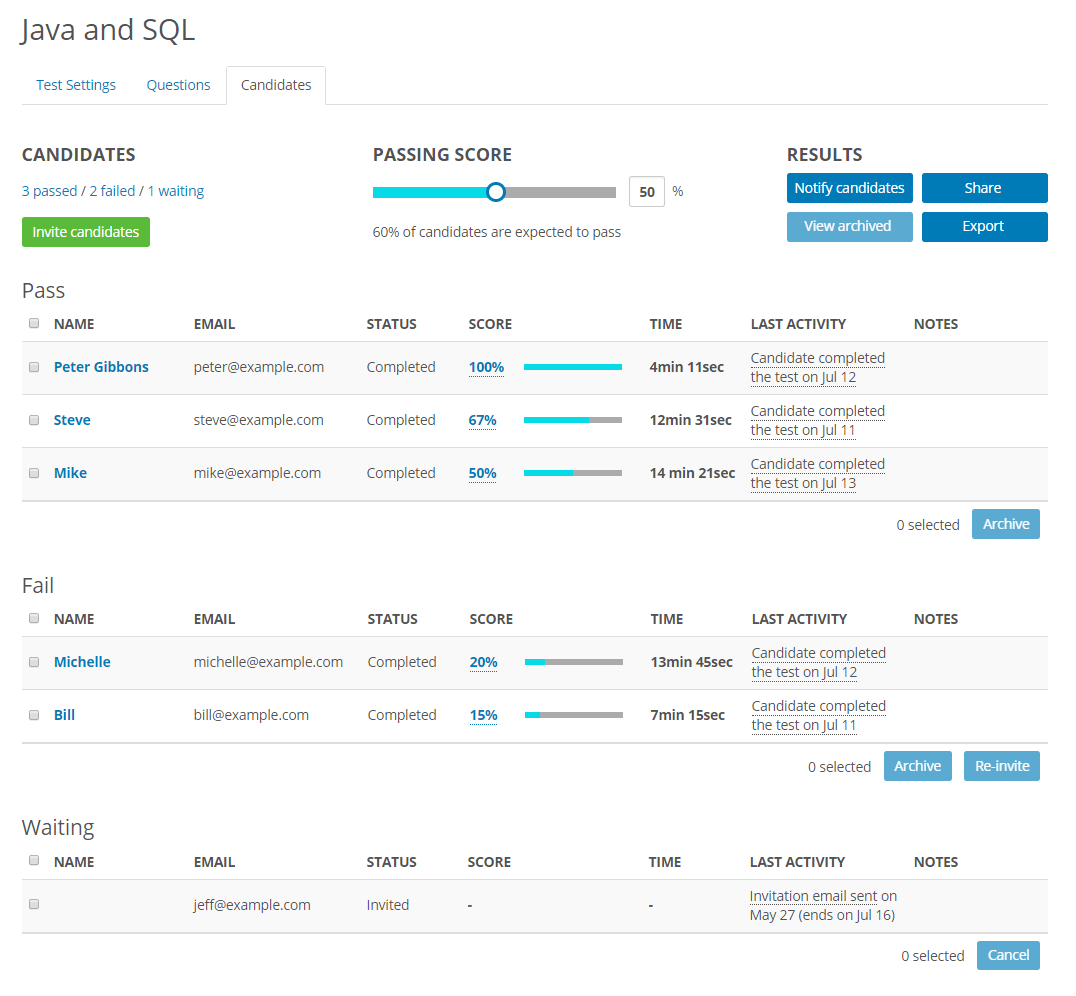
(Image Source: Software Advice)
TestDome has been a cornerstone of our standardized testing approach for screening candidates efficiently. Its library of pre-designed tests covers a wide range of skills and roles, allowing us to deploy assessments that are both relevant and challenging quickly.
The platform ensures a high level of fairness and objectivity, as every candidate is subjected to the same rigorous standards, and the automated scoring eliminates any bias from the initial screening phase.
This helps in maintaining a high caliber of candidates moving forward in the recruitment process, making TestDome crucial for our efforts to uphold meritocracy in hiring.
What You Will Like:
- A wide array of topics ensures that many job-specific skills can be assessed.
- Automated scoring features that deliver results instantly, speeding up the hiring process.
- Tests are cheat-proof, maintaining the integrity of the assessment process.
- Custom test options are available that allow for better job role alignment.
- The tool integrates seamlessly with Applicant Tracking Systems (ATS), which streamlines recruitment.
What You May Not Like:
- There are accessibility issues for candidates with disabilities.
- Lacks depth in industry-specific tests that affect the relevance of specialized roles.
Pricing: Starts at $20/candidate for up to 5 candidates.
6. Toggl Hire
Best for Role-Based Hiring
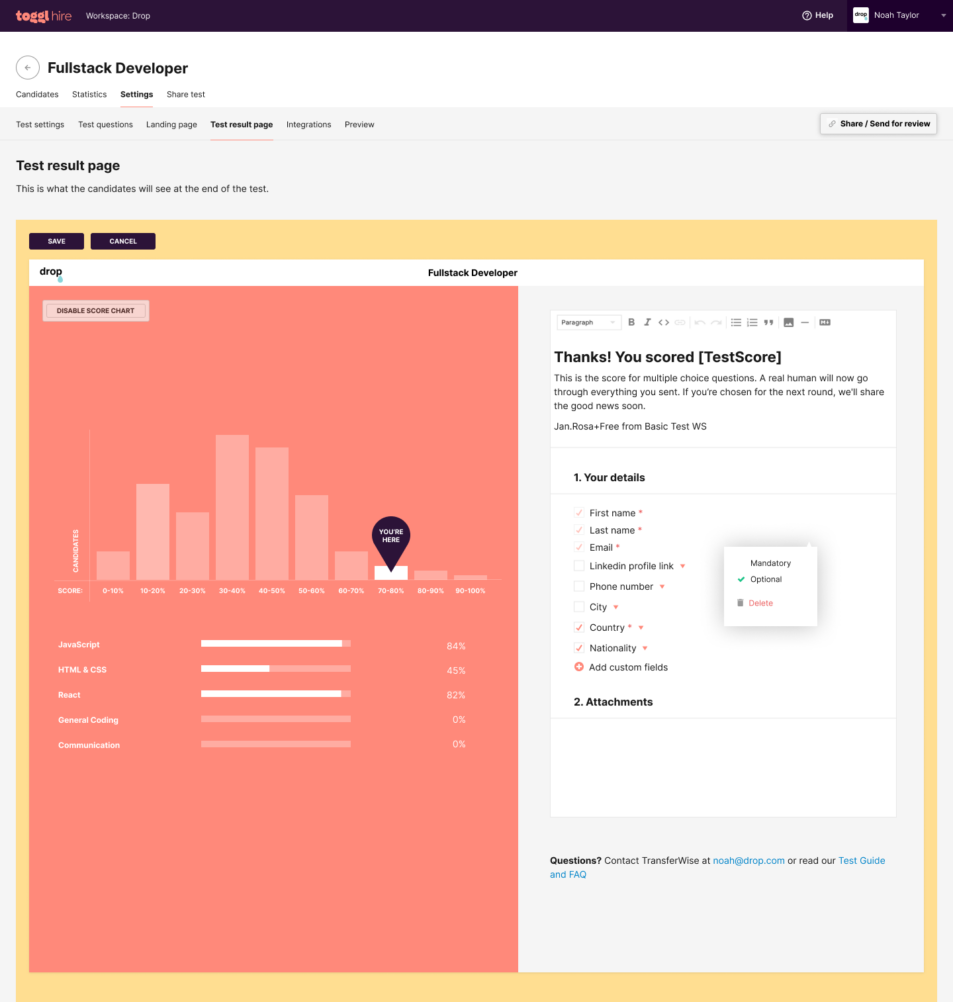
(Image Source: Toggl)
Using Toggl Hire has revolutionized our role-based hiring by allowing the quick creation of custom tests that accurately reflect the specific skills each position requires.
Its intuitive design lets me set up tests in minutes, and the results provide clear insights into each candidate’s proficiency. This specificity is vital in our high-volume recruitment phases, ensuring that we efficiently process many candidates without compromising on the quality or relevance of the assessment.
The tool also has smart analytics features that also help me identify standout candidates swiftly, significantly reducing the time-to-hire and improving the overall effectiveness of our recruitment strategy.
What You Will Like:
- The platform is extensive and user-friendly, making it accessible even for those without extensive HR training.
- It integrates with other Toggl productivity tools, creating a cohesive workflow.
- Supports smart scoring that prioritizes candidate skills effectively, aiding in the selection process.
- A large question bank that is developed by industry experts, enhancing the quality of assessments.
- It accommodates flexible testing scenarios, including remote options.
What You May Not Like:
- Its focus is mainly on tech and digital marketing, which may not be broad enough for some companies.
- The platform offers limited support for very specialized or niche roles, which might necessitate additional tools.
Pricing: Starts at $25/month for up to 20 candidates.
7. Bryq
Best for Cultural Alignment Measurement
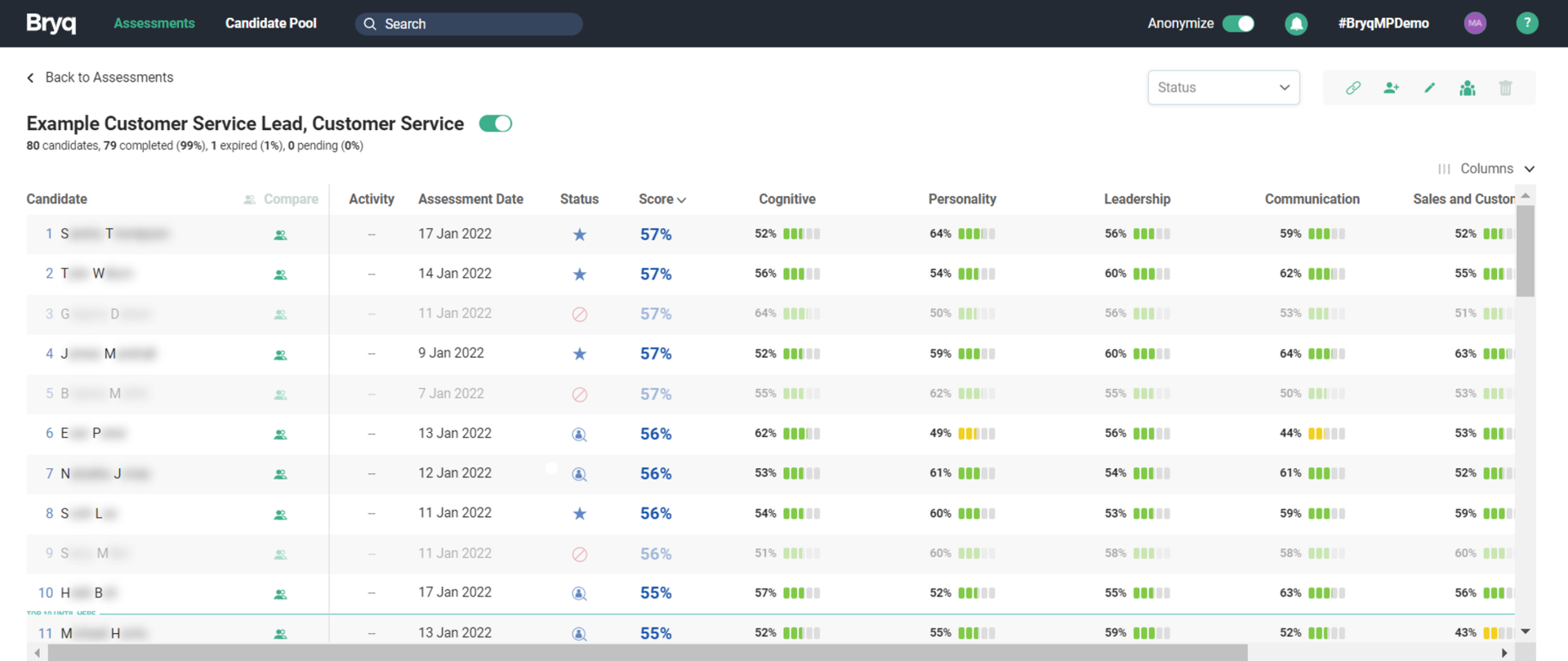
(Image Source: Bryq)
In my experience, Bryq is a standout hiring assessment tool that measures cultural alignment and ensures each hire contributes positively to our company ethos.
By evaluating cognitive abilities and personality traits, Bryq helped me understand how candidates are likely to behave in our specific work environment. This predictive insight is critical for long-term retention and satisfaction, as it ensures that new hires fit well with our organizational values and team dynamics.
Also, with its smart reporting feature, the tool aids the decision-making process, making it easier to choose candidates who are not only capable but also culturally compatible.
What You Will Like:
- Evaluates both personality traits and cognitive abilities, providing a well-rounded view of candidates.
- Supports a wide range of customization options that allow the tool to reflect an organization’s unique culture.
- Results are easy to interpret, helping to make quick and accurate hiring decisions.
- It is applicable across different hiring levels, from new hires to senior executives.
- Integrates with major HR software, like BambooHR, and ensures smooth data management.
What You May Not Like:
- Delays in score migration to ATS platforms, which can complicate the recruitment process.
- Limited visibility for hiring managers on candidate results can hinder the ability to make fully informed decisions.
Pricing: Custom pricing.
8. Pymetrics
Best for Leadership Assessment
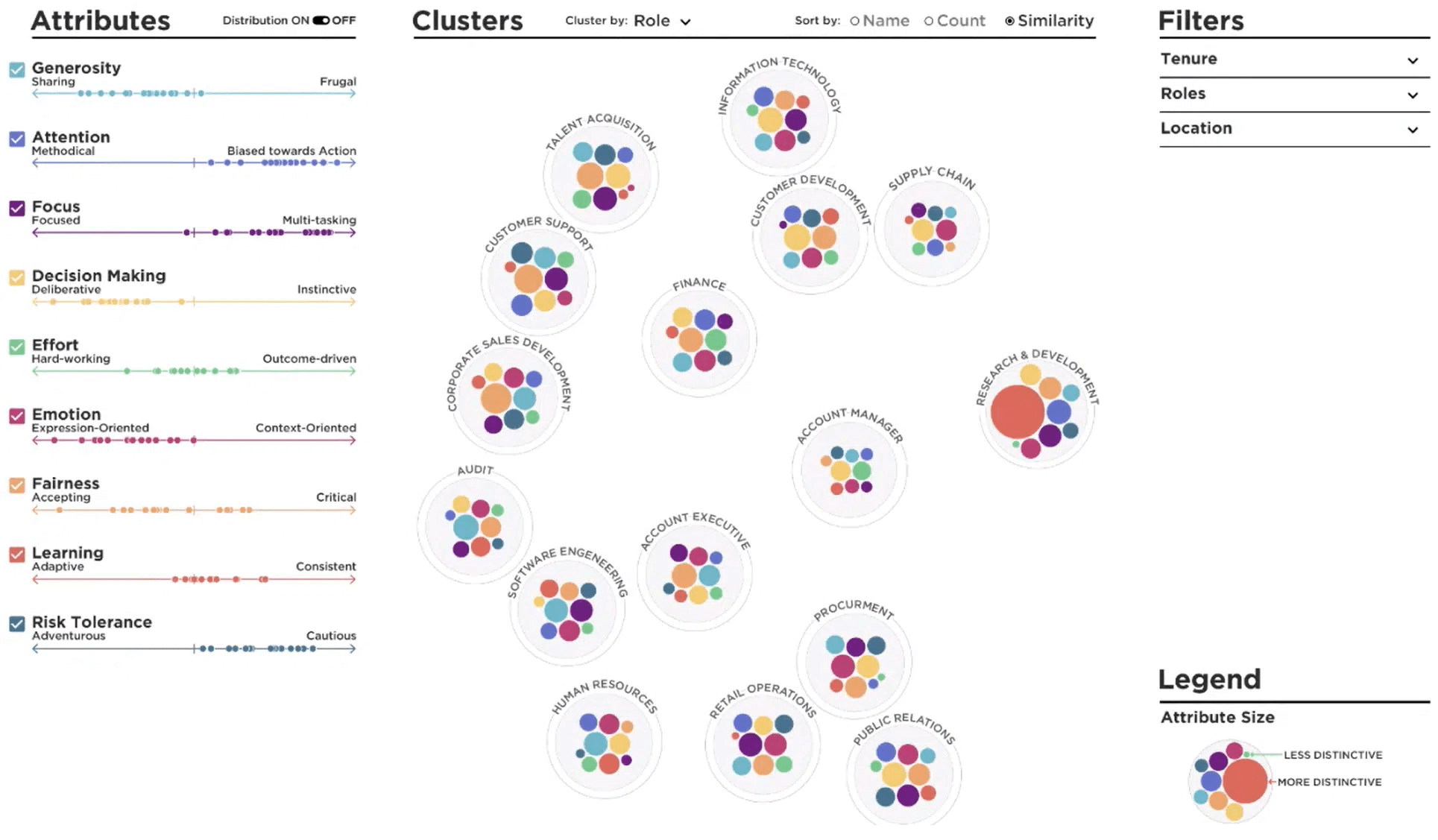
(Image Source: Pymetrics)
My extensive use of Pymetrics has proven it to be a powerful leadership assessment tool for assessing leadership qualities through innovative, game-based evaluations.
The platform’s reliance on neuroscience and AI for analyzing behavior provides a unique perspective on a candidate’s leadership potential, including their ability to handle stress, empathize with others, and make strategic decisions.
This level of insight is invaluable when selecting individuals for leadership roles, as these positions require more than just technical skills—they demand a capacity for vision, influence, and adaptability.
What You Will Like:
- The game-like format of assessments reduces candidate stress and increases engagement.
- Traits like risk tolerance and empathy are measured objectively, providing clear leadership insights.
- The tool’s data-driven approach supports unbiased hiring decisions.
- The scalability of the tool allows it to be used across various organizational levels.
- Easy integration with the major ATS platforms that improves recruitment efficiency.
What You May Not Like:
- The assessments require significant time from candidates, which might affect completion rates.
- As a relatively new technology, it lacks extensive historical data to validate its effectiveness fully.
Pricing: Custom pricing.
9. Canditech
Best for Video Interviews
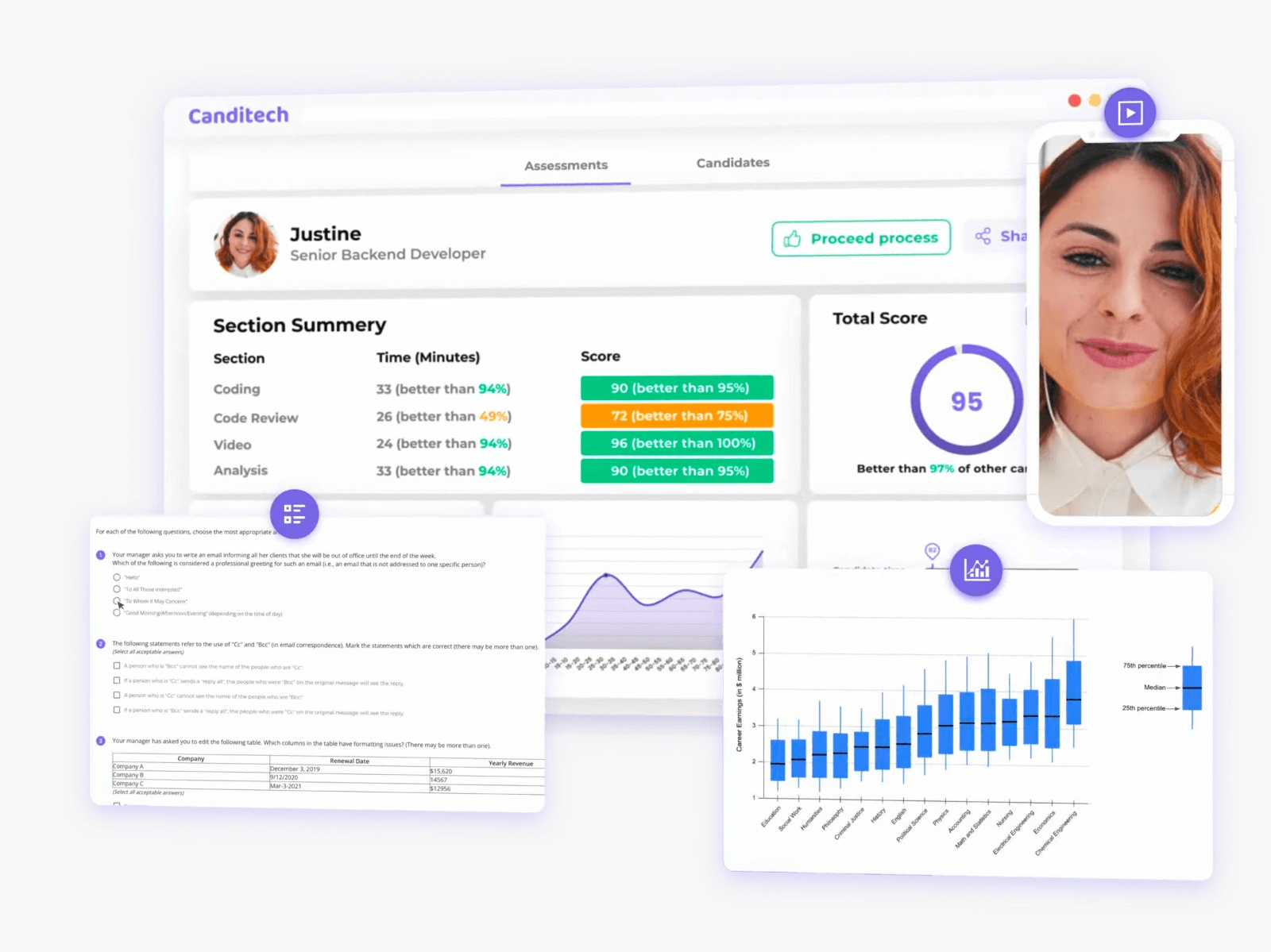
Canditech has greatly enhanced our interview process, particularly for remote positions. Its video interview platform allows for a seamless, interactive experience that captures the nuances of a candidate’s communication and presentation skills.
The ability to conduct both live and pre-recorded interviews facilitates a flexible interview process that can accommodate various time zones and schedules.
Canditech’s review and collaboration features enable our hiring teams to share feedback and make collective decisions efficiently, ensuring that the candidate not only meets our technical requirements but also excels in interpersonal interactions.
What You Will Like:
- Automated scheduling features for interviews that reduce the administrative burden on HR departments.
- AI-driven analysis of verbal and non-verbal cues that provide additional insights into candidate suitability.
- Customizable interview templates to ensure consistency across interviews.
- The platform is accessible on all kinds of mobile devices, making it possible to reach a broader array of candidates.
- It integrates smoothly with existing HR systems, maintaining a streamlined hiring process.
What You May Not Like:
- Reliable internet connectivity is required for both interviewers and candidates, which can be a limiting factor.
- Faces some technical issues during interviews, which could negatively impact the candidate’s experience and assessment accuracy.
Pricing: Starts at $90/month. Billed yearly.
10. Hire Success
Best for Personality Tests
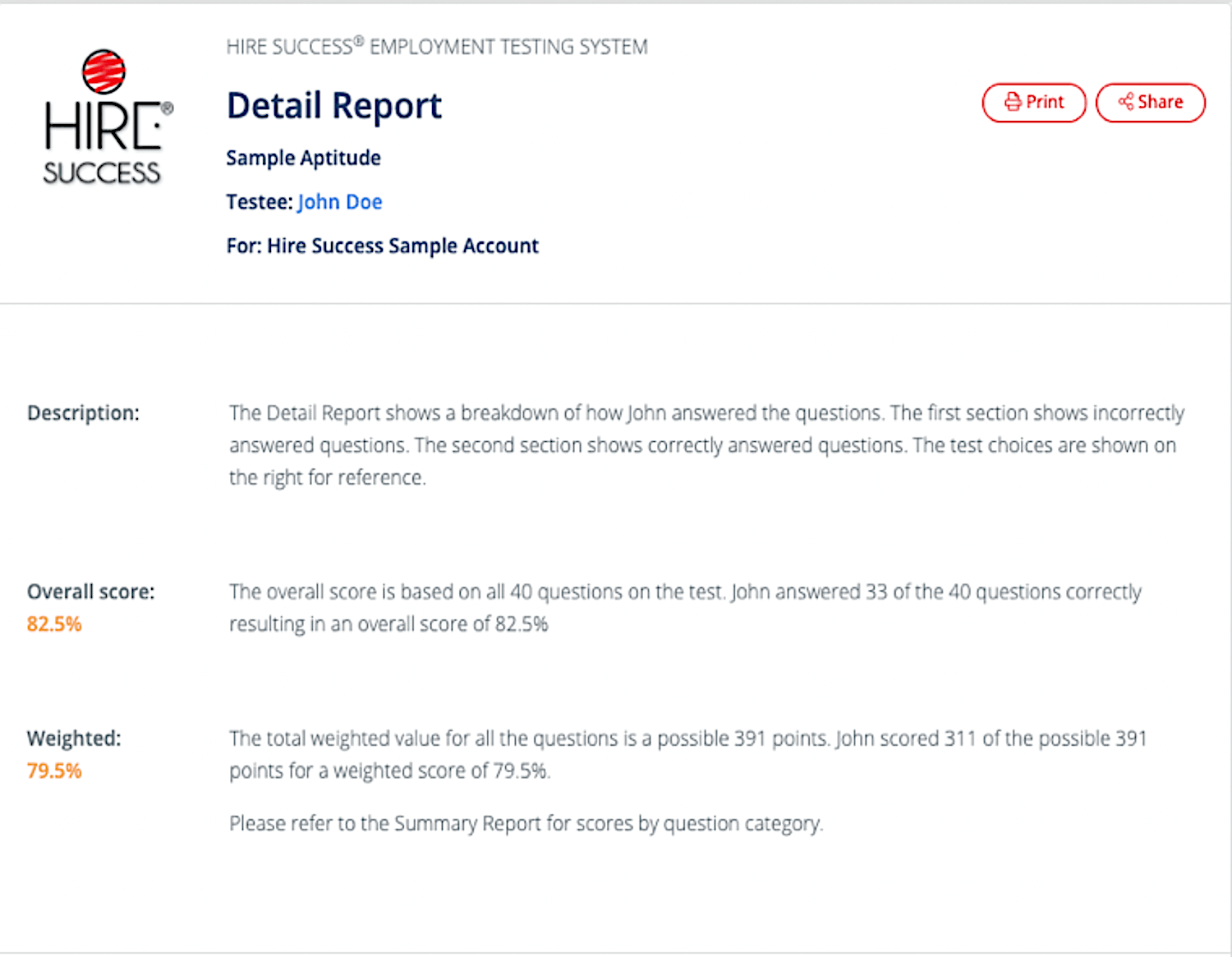
(Image Source: Hire Success)
Hire Success is my preferred tool for personality testing during the recruitment process. Its comprehensive personality profiles help us delve deeper into each candidate’s characteristics, such as their adaptability, conflict resolution style, and leadership potential.
This deeper understanding is essential for placing candidates in roles where they will thrive, not just succeed.
By aligning personal traits with job requirements, Hire Success helps us build teams that are resilient, dynamic, and aligned with our core values, significantly enhancing both individual and organizational performance.
What You Will Like:
- Real-time results that are offered quickly to facilitate a speedy recruitment process.
- The tool is user-friendly and straightforward to administer, requiring minimal training.
- You can create custom tests tailored to specific job descriptions by choosing from an extensive library of questions or adding your own.
- It can be integrated with a company’s career site or job board, allowing automated test administration as part of the application process.
- Offers extensive customer support and the ability to customize many aspects of the testing process.
What You May Not Like:
- There are design biases within the tests that could skew results, impacting fairness.
- The platform involves a learning curve to fully understand and utilize all its features effectively.
Pricing: Custom pricing, as per the monthly or yearly plan.
Watch: How to Choose the Best Assessment Software
Evaluation Criteria
The evaluation of online test maker tools chosen for this article follows an unbiased, systematic approach that ensures a fair, insightful, and well-rounded review. This method employs six key factors:
- User Reviews / Ratings: Direct experiences from users, including ratings and feedback from reputable sites, provide a ground-level perspective. This feedback is critical in understanding overall satisfaction and potential problems.
- Essential Features & Functionality: The value of a product is ascertained by its core features and overall functionality. Through an in-depth exploration of these aspects, the practical usefulness and effectiveness of the tools are carefully evaluated.
- Ease of Use: The user-friendliness of a product or service is assessed, focusing on the design, interface, and navigation. This ensures a positive experience for users of all levels of expertise.
- Customer Support: The quality of customer support is examined, taking into account its efficiency and how well it supports users in different phases – setting up, addressing concerns, and resolving operational issues.
- Value for Money: Value for money is evaluated by comparing the quality, performance, and features. The goal is to help the reader understand whether they would be getting their money’s worth.
- Personal Experience / Experts’ Opinions: This part of the evaluation criteria draws insightful observations from the personal experience of the writer and the opinions of industry experts.
Why Should Organizations Use Hiring Assessment Tools?
Organizations should use hiring assessment tools for several key reasons:
- Improved Hiring Quality: These tools help in assessing the technical skills, personality traits, and cultural fit of candidates more accurately, leading to better hiring decisions.
- Efficiency: They streamline the recruitment process by quickly filtering out unsuitable candidates, saving time and resources for the HR department.
- Reduced Bias: By standardizing the evaluation process, these tools minimize personal biases that might affect the hiring decision, promoting a more fair and objective recruitment process.
- Predictive Insights: Candidate assessment tools can provide data-driven insights into a candidate’s potential performance, helping predict job success and retention rates more effectively.
- Enhanced Candidate Experience: A well-structured assessment process can improve the candidate experience, portraying the organization as diligent and committed to hiring the best fit.
Here is a case study for you:
Discover how Strategy& created an online assessment that could simultaneously assess 900 candidates.
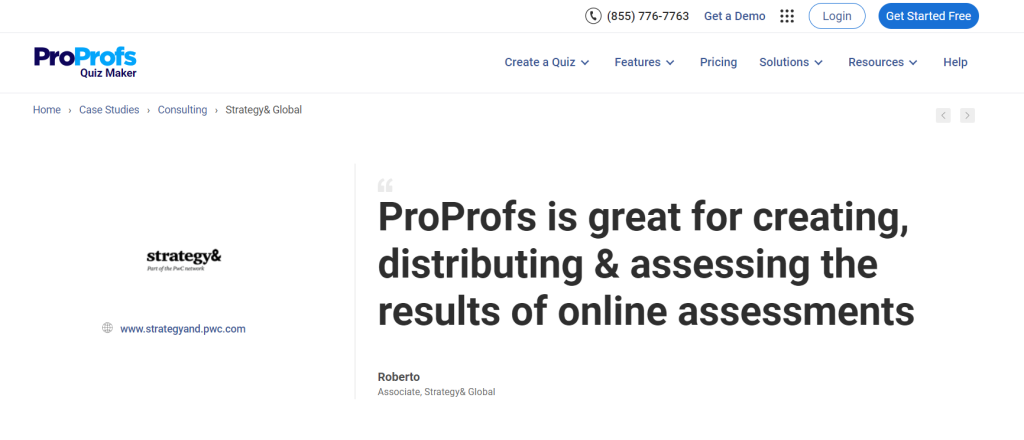
FREE. All Features. FOREVER!
Try our Forever FREE account with all premium features!
How to Use Hiring Assessment Tools
Using hiring assessment tools effectively involves several key steps:
- Identify the Requirements: Determine what specific qualities, skills, and attributes are essential for the role. This will help in selecting or designing an assessment tool that best measures these qualities.
- Choose the Right Tool: Select from various types of tools available—such as cognitive tests, personality assessments, skills tests, or job simulations—based on the role and the company’s hiring goals. Ensure the tool is validated and compliant with employment laws.
- Integrate into the Hiring Process: Position the assessment at an appropriate stage in the hiring process. For some roles, it might be beneficial to assess skills early on, while for others, it may be better after an initial screening.
- Train Assessors: Ensure that HR professionals and hiring managers are trained on how to administer the assessments and interpret the results accurately and fairly.
- Communicate with Candidates: Clearly inform candidates about the assessment process, what to expect, and how it fits into the larger hiring process. Transparency can improve candidate experience and participation.
- Analyze Results: Use the data collected from assessments to make informed hiring decisions. Look for insights not only about individual candidates but also about the assessment process itself for continuous improvement.
- Feedback and Refinement: Collect feedback from both candidates and hiring managers on the effectiveness of the assessment. Use this feedback to refine the tool and process over time.
Implementing these steps can help maximize the benefits of hiring assessment tools, making the recruitment process more efficient, fair, and effective.
What Are the Benefits of Hiring Assessment Tools?
Some of the major benefits of using hiring or recruitment assessment tools are as follows:
- Improved Quality of Hire:
These tools help in assessing the skills, personality, and work style of candidates, ensuring that the individuals selected are better suited for the specific roles and the company culture.
Example: A tech company uses a coding assessment tool during the hiring process to evaluate candidates’ actual coding abilities and problem-solving skills. This ensures that only those who meet the technical requirements make it to the final interview rounds, thereby improving the quality of hires.
- Reduced Bias:
Standardized assessments provide objective data points that can help reduce unconscious bias in hiring decisions, promoting fairness and diversity in the recruitment process.
Example: A company implements an AI-driven assessment tool that scores candidates based on their responses to job-related scenarios without considering their name, gender, or ethnicity. This helps in making the selection process more objective and less prone to biases.
- Efficient Screening Process:
Assessment tools can quickly screen large volumes of applicants, identifying the most promising candidates and significantly reducing the time spent on manual resume reviews.
Example: An HR department uses an applicant tracking system (ATS) with built-in assessment capabilities to automatically rank candidates based on predetermined criteria such as experience, education, and specific skills, thus speeding up the initial screening process.
- Predictive Analysis:
Some advanced assessment tools use predictive analytics to forecast how well a candidate will perform in a role, based on data collected from current successful employees.
Example: A sales organization uses a personality assessment tool to predict candidate success in sales roles by comparing prospective candidates’ personality traits with those of top-performing sales staff.
- Enhanced Candidate Experience:
Modern assessment tools often provide a more engaging and interactive application process that can improve the candidate’s perception of the company.
Example: A company introduces gamified assessment tools in its recruitment process, making the evaluation enjoyable and engaging. Candidates feel more at ease and perform better, leaving a positive impression of the company regardless of the outcome.
- Cost Efficiency:
By automating part of the recruitment process and improving the accuracy of hiring decisions, these tools can reduce the costs associated with bad hires and turnover.
Example: A retail chain uses a video interviewing tool combined with behavioral assessments to pre-screen candidates. This reduces the need for multiple in-person interviews and cuts down travel costs and time spent by HR, leading to substantial cost savings.
- Regulatory Compliance:
Standardized assessments ensure that hiring practices are compliant with legal requirements by providing consistent and fair evaluation metrics.
Example: A multinational corporation uses compliance-ready assessment tools that are vetted to adhere to various national employment laws, helping the company maintain legal compliance across different regions.
Read: Benefits of Online Assessments for Learning & Hiring: Going Beyond Traditional Evaluation Methods
Maximize Recruitment Success With Hiring Assessment Tools
These days, employers are increasingly turning to hiring assessment tools to streamline their recruitment processes and secure the best talent. The tools not only enhance hiring efficiency but also ensure a better fit by evaluating candidates beyond their resumes.
They provide invaluable insights into a candidate’s skills, personality, and potential fit within a company’s culture, leading to more informed hiring decisions. Among all the tools I have used, ProProfs Quiz Maker is my top choice. With its smart features, such as an AI quiz generators, 100+ customizable quiz templates, and a user-friendly interface, ProProfs Quiz Maker simplifies the creation and administration of assessments, making it an essential asset for any hiring toolkit.

 We'd love your feedback!
We'd love your feedback! Thanks for your feedback!
Thanks for your feedback!







